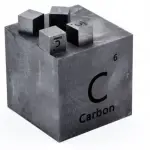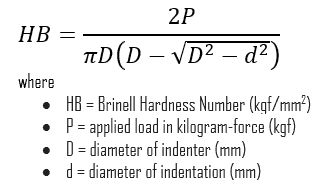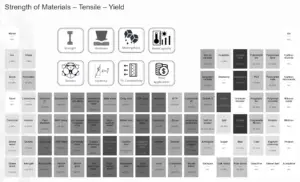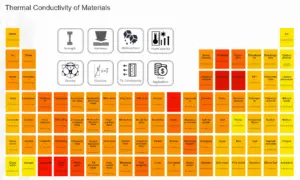About Bituminous Coal
Coal is a rock formed from the decomposition of plant life. It is primarily composed of carbon, with many other trace elements. Bituminous coal or black coal is a relatively soft coal containing a tarlike substance called bitumen or asphalt. It is of higher quality than lignite and Sub-bituminous coal, but of poorer quality than anthracite.
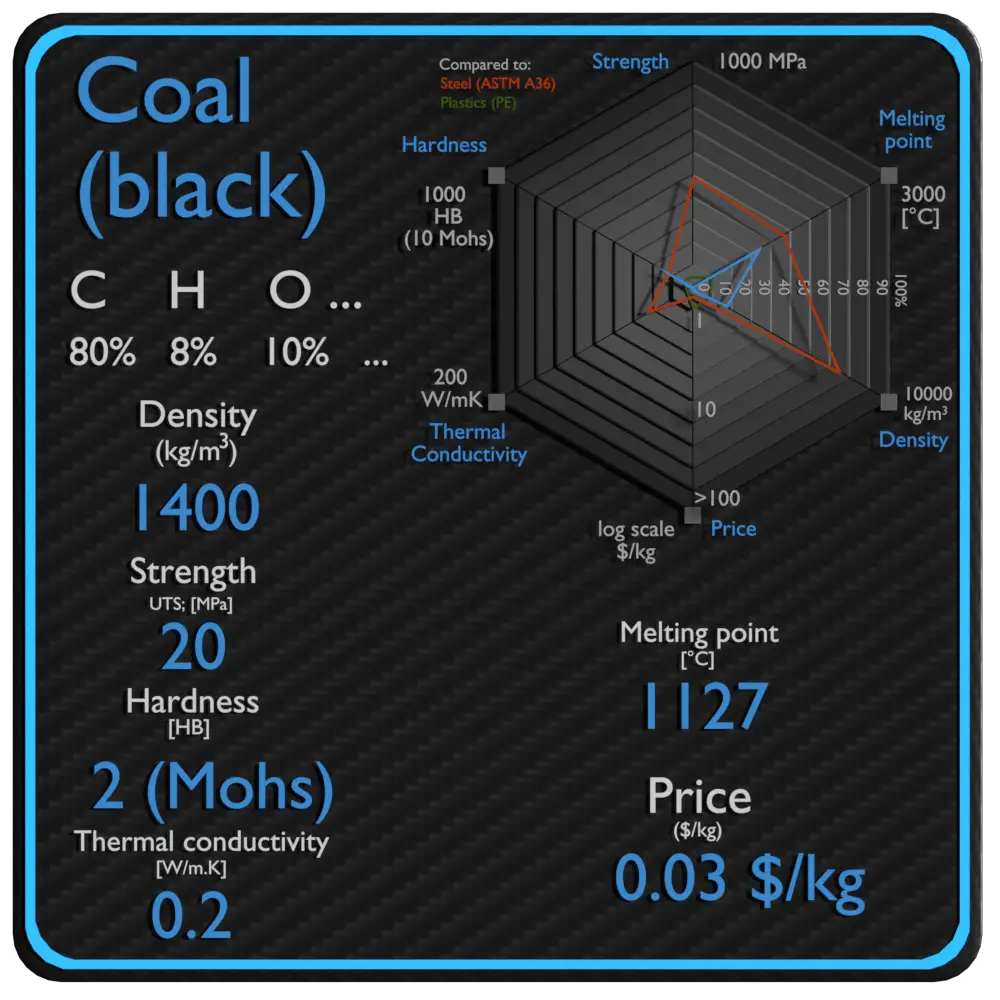
Summary
| Name | Bituminous Coal |
| Phase at STP | solid |
| Density | 1400 kg/m3 |
| Ultimate Tensile Strength | 20 MPa |
| Yield Strength | N/A |
| Young’s Modulus of Elasticity | N/A |
| Brinell Hardness | 2 Mohs |
| Melting Point | 1127 °C |
| Thermal Conductivity | 0.2 W/mK |
| Heat Capacity | 1380 J/g K |
| Price | 0.03 $/kg |
Composition of Bituminous Coal
Coal is composed of macerals, minerals and water. Exact composition of coal is strongly dependent foremost on the time during which the conversion from plant matter to the final mineral took place. The older the coal, the higher the carbon percentage and the less apparent the original vegetable component, i.e. the fossil, remains of plant tissues, resin, etc. And, in particular, such coal is of higher quality and is in greater demand. However, besides that coalification and representation of impurities is dependent on other circumstances, in particular on species composition of plants from which the coal was formed, on the character of the deposit, geological history. Bituminous coal is an organic sedimentary rock formed by diagenetic and sub metamorphic compression of peat bog material. Its primary constituents are macerals: vitrinite, and liptinite. The carbon content of bituminous coal is around 45–86%; the rest is composed of water, air, hydrogen, and sulfur, which have not been driven off from the macerals. Elemental analysis gives empirical formulas such as C137H97O9NS for bituminous coal and C240H90O4NS for high-grade anthracite.
Applications of Bituminous Coal
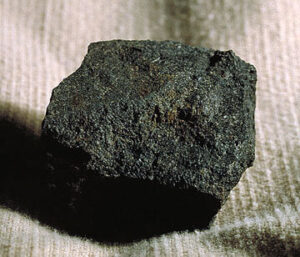
Coal’s high energy density and extensive reserves found in nature make it useful as a fuel for electricity generation in coal-fired power plants, and in some places, heating. About 8000 Mt of coal are produced annually, about 90% of which is hard coal and 10% lignite. As of 2018 just over half is from underground mines. The most significant uses of coal are in electricity generation, steel production, cement manufacturing and as a liquid fuel.
Mechanical Properties of Bituminous Coal
Strength of Bituminous Coal
In mechanics of materials, the strength of a material is its ability to withstand an applied load without failure or plastic deformation. Strength of materials basically considers the relationship between the external loads applied to a material and the resulting deformation or change in material dimensions. In designing structures and machines, it is important to consider these factors, in order that the material selected will have adequate strength to resist applied loads or forces and retain its original shape.
Strength of a material is its ability to withstand this applied load without failure or plastic deformation. For tensile stress, the capacity of a material or structure to withstand loads tending to elongate is known as ultimate tensile strength (UTS). Yield strength or yield stress is the material property defined as the stress at which a material begins to deform plastically whereas yield point is the point where nonlinear (elastic + plastic) deformation begins. In case of tensional stress of a uniform bar (stress-strain curve), the Hooke’s law describes behaviour of a bar in the elastic region. The Young’s modulus of elasticity is the elastic modulus for tensile and compressive stress in the linear elasticity regime of a uniaxial deformation and is usually assessed by tensile tests.
See also: Strength of Materials
Ultimate Tensile Strength of Bituminous Coal
Ultimate tensile strength of Bituminous Coal is 20 MPa.
Yield Strength of Bituminous Coal
Yield strength of Bituminous Coal is N/A.
Modulus of Elasticity of Bituminous Coal
The Young’s modulus of elasticity of Bituminous Coal is N/A.
Hardness of Bituminous Coal
In materials science, hardness is the ability to withstand surface indentation (localized plastic deformation) and scratching. Brinell hardness test is one of indentation hardness tests, that has been developed for hardness testing. In Brinell tests, a hard, spherical indenter is forced under a specific load into the surface of the metal to be tested.
The Brinell hardness number (HB) is the load divided by the surface area of the indentation. The diameter of the impression is measured with a microscope with a superimposed scale. The Brinell hardness number is computed from the equation:
Hardness of Bituminous Coal is approximately 2 Mohs.
See also: Hardness of Materials
Thermal Properties of Bituminous Coal
Bituminous Coal – Melting Point
Melting point of Bituminous Coal is 1127 °C.
Note that, these points are associated with the standard atmospheric pressure. In general, melting is a phase change of a substance from the solid to the liquid phase. The melting point of a substance is the temperature at which this phase change occurs. The melting point also defines a condition in which the solid and liquid can exist in equilibrium. For various chemical compounds and alloys, it is difficult to define the melting point, since they are usually a mixture of various chemical elements.
Bituminous Coal – Thermal Conductivity
Thermal conductivity of Bituminous Coal is 0.2 W/(m·K).
The heat transfer characteristics of a solid material are measured by a property called the thermal conductivity, k (or λ), measured in W/m.K. It is a measure of a substance’s ability to transfer heat through a material by conduction. Note that Fourier’s law applies for all matter, regardless of its state (solid, liquid, or gas), therefore, it is also defined for liquids and gases.
The thermal conductivity of most liquids and solids varies with temperature. For vapors, it also depends upon pressure. In general:
Most materials are very nearly homogeneous, therefore we can usually write k = k (T). Similar definitions are associated with thermal conductivities in the y- and z-directions (ky, kz), but for an isotropic material the thermal conductivity is independent of the direction of transfer, kx = ky = kz = k.
Bituminous Coal – Specific Heat
Specific heat of Bituminous Coal is 1380 J/g K.
Specific heat, or specific heat capacity, is a property related to internal energy that is very important in thermodynamics. The intensive properties cv and cp are defined for pure, simple compressible substances as partial derivatives of the internal energy u(T, v) and enthalpy h(T, p), respectively:
where the subscripts v and p denote the variables held fixed during differentiation. The properties cv and cp are referred to as specific heats (or heat capacities) because under certain special conditions they relate the temperature change of a system to the amount of energy added by heat transfer. Their SI units are J/kg K or J/mol K.
Properties and prices of other materials
material-table-in-8k-resolution
